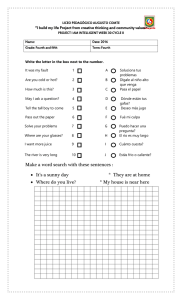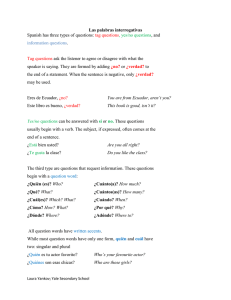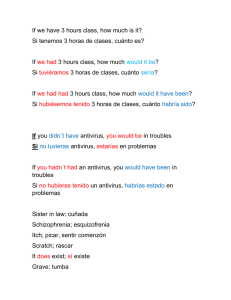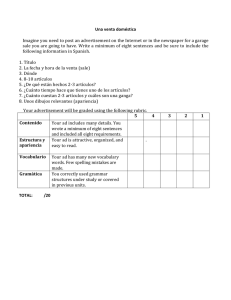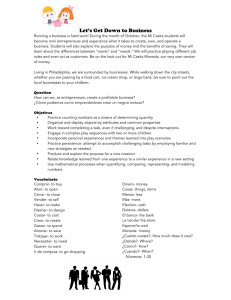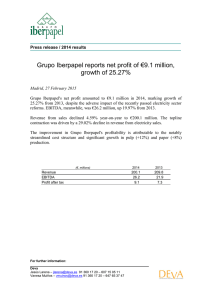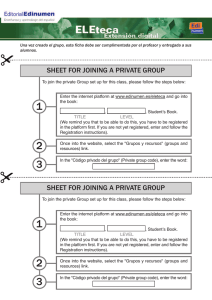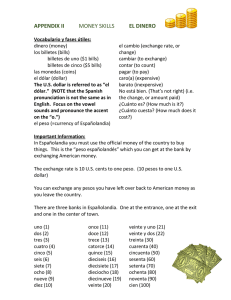spa 319 Latin American Civilization and Culture
Anuncio
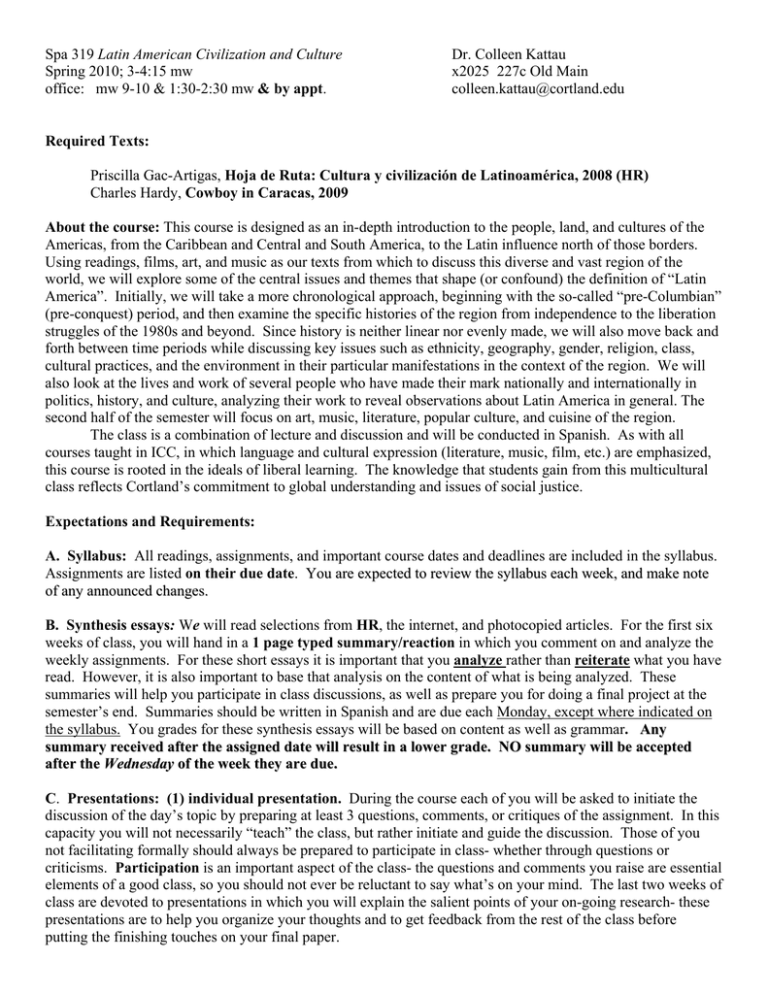
Spa 319 Latin American Civilization and Culture Spring 2010; 3-4:15 mw office: mw 9-10 & 1:30-2:30 mw & by appt. Dr. Colleen Kattau x2025 227c Old Main [email protected] Required Texts: Priscilla Gac-Artigas, Hoja de Ruta: Cultura y civilización de Latinoamérica, 2008 (HR) Charles Hardy, Cowboy in Caracas, 2009 About the course: This course is designed as an in-depth introduction to the people, land, and cultures of the Americas, from the Caribbean and Central and South America, to the Latin influence north of those borders. Using readings, films, art, and music as our texts from which to discuss this diverse and vast region of the world, we will explore some of the central issues and themes that shape (or confound) the definition of “Latin America”. Initially, we will take a more chronological approach, beginning with the so-called “pre-Columbian” (pre-conquest) period, and then examine the specific histories of the region from independence to the liberation struggles of the 1980s and beyond. Since history is neither linear nor evenly made, we will also move back and forth between time periods while discussing key issues such as ethnicity, geography, gender, religion, class, cultural practices, and the environment in their particular manifestations in the context of the region. We will also look at the lives and work of several people who have made their mark nationally and internationally in politics, history, and culture, analyzing their work to reveal observations about Latin America in general. The second half of the semester will focus on art, music, literature, popular culture, and cuisine of the region. The class is a combination of lecture and discussion and will be conducted in Spanish. As with all courses taught in ICC, in which language and cultural expression (literature, music, film, etc.) are emphasized, this course is rooted in the ideals of liberal learning. The knowledge that students gain from this multicultural class reflects Cortland’s commitment to global understanding and issues of social justice. Expectations and Requirements: A. Syllabus: All readings, assignments, and important course dates and deadlines are included in the syllabus. Assignments are listed on their due date. You are expected to review the syllabus each week, and make note of any announced changes. B. Synthesis essays: We will read selections from HR, the internet, and photocopied articles. For the first six weeks of class, you will hand in a 1 page typed summary/reaction in which you comment on and analyze the weekly assignments. For these short essays it is important that you analyze rather than reiterate what you have read. However, it is also important to base that analysis on the content of what is being analyzed. These summaries will help you participate in class discussions, as well as prepare you for doing a final project at the semester’s end. Summaries should be written in Spanish and are due each Monday, except where indicated on the syllabus. You grades for these synthesis essays will be based on content as well as grammar. Any summary received after the assigned date will result in a lower grade. NO summary will be accepted after the Wednesday of the week they are due. C. Presentations: (1) individual presentation. During the course each of you will be asked to initiate the discussion of the day’s topic by preparing at least 3 questions, comments, or critiques of the assignment. In this capacity you will not necessarily “teach” the class, but rather initiate and guide the discussion. Those of you not facilitating formally should always be prepared to participate in class- whether through questions or criticisms. Participation is an important aspect of the class- the questions and comments you raise are essential elements of a good class, so you should not ever be reluctant to say what’s on your mind. The last two weeks of class are devoted to presentations in which you will explain the salient points of your on-going research- these presentations are to help you organize your thoughts and to get feedback from the rest of the class before putting the finishing touches on your final paper. (2) Group Presentation. Late March is devoted to group presentations in which group members research and present a cultural topic. Group members can be chosen and you all decide what your group topic will be. All group members are to participate collectively, i.e., you must work together to organize and present the material, do not simply divide up the work and them come together to present it. Groups are encouraged to use audiovisual materials, artwork, food, music etc. I will provide you with a list of suggested topics but you are not limited to the list I give you. C. Tests. There are one mid-term and one final exam. D. Research paper. The final research paper must be 5-6 pages in length with at least four outside scholarly references, at least three of which should be Spanish sources. You may find that ideas for paper topics may come out of the weekly summaries you write for this course. The more specific the topic the better. Again, I will provide you with suggestions based on what other students have chosen to do in the past. You are encouraged to meet with me individually about your topic and provide a rough draft of the paper to which I will make comments and suggestions. Academic integrity: see chapter 340 of College handbook found in Student Life website. E. Participation. You are allowed five absences, after which your final grade will be lowered by one half letter grade for each additional absence. The success of the class depends upon your participation in it! Evaluation: essays: (grammar and content determines grade) participation* (also includes ind. presentation & attendance) midterm: group presentations: final paper: final exam 20% 15% 20% 10% 15% 20% Grading: 100-97= A+; 94-96=A , 90-93= A-, 87-89=B+, 83-86=B , 80-82= B-, 77-79= C+, 73-76=C, 70-72= C-, 69-67 = D+, 66-64 D, 63-60= D-. Plan of Study (This may change according to our needs) date due Jan 25 m introducción topic / day’s reading work due Jan. 27 w las primeras civilizaciones (Los mayas y los aztecas) HR 16-34 Feb. 1 las primeras civilizaciones (región andina y caribeña) HR 34-50 ensayo 1 pp. 55-56; p. 57. 3, 5,6 Feb. 3 Geografía de América Latina HR 106-122 ***By Wed., February 10, view, The Mission (in library or through video store) *** Feb. 8 “Descubrimiento,” y conquista Feb. 10 “Descubrimiento,” y conquista HR 63-72 Zinn, Chapter 1 A People’s History of the United States ensayo 2 HR 72-84 & fc; cuánto sabemos pp88-89 Discussion of The Misión Feb. 15 Bartolomé de las Casas Preguntas de comprensión y repaso, p.85 ensayo 3 Feb. 17 Las venas abierta de América Latina, Eduardo Galeano fotocopia Feb. 22 La independencia HR 91-104 Feb. 24 José Martí HR 104-105; versos sencillos, selección March 1 Movimientos revolucionarios cuánto sabemos 92-93; HR 123-141 ensayo 4 ensayo 5 March 3 Movimientos revolucionarios HR 141-160; ¿Cuánto sabemos? 165-167 March 8 El nuevo mapa político HR 173-191 cuánto sabemos, p. 174 ensayo 6 March 10 examen de mid-term March 22 El nuevo mapa político March 24 Discussion of Cowboy In Caracas HR 192-250 El nuevo mapa político HR p. 250-286 cuánto sabemos, p. 288 ensayo 7 This week begins group presentations March29 La religión y la teología de la liberación HR 377-386; preguntas y cuánto sabemos, 385-387 March 31 La música latinoamericana HR 405-416 presentación de grupo 1, 2 April 5 La música latinoamericana* traigan ejemplos de música latinoamericana presentación de grupo 3,4 April 7 La educación y Paulo Freire HR 361-375 presentación de grupo 3 presentación de grupo 5,6 April 12 la literatura HR 419-436 presentación de grupo 7 April 14 la literatura HR 363-367 cuánto sabemos, p. 362 & 375 April 19 película ambiental “Tambogrande” April 21 película ambiental “Crude” or TBA borrador del trabajo final April 26 La mujer en América Latina HR 312-339; cuánto sabemos? p. 312 & 342-344 April 28 Las artes HR 441-457; HR 441-457 cuánto sabemos, p. 442 & 456 May 3 El cine HR 389-397 May 5 presentaciones del trabajo final / evaluación May 10 presentaciones del trabajo final / repaso para examen final examen final: Friday, May 14 3-4:15 pm , Dowd 206 Final paper due on last day of class.
